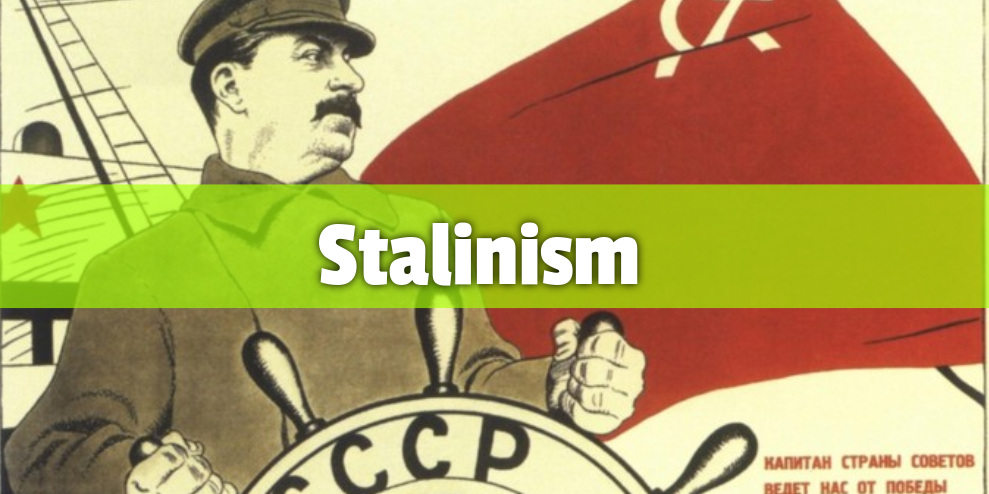Stalinism

The ideological form taken by the consolidation of the counter-revolution in Russia from which it spread through the subjugation and instrumentalization of the Third International since its Fifth Congress and the Russian imperialist expansion from the 1940s onwards. Its main characteristic is the identification as "socialism" of a state capitalism based on a party-state fusion and the affirmation of a state-run, centralized and militarized organization of production. Despite taking particular forms in different countries and generating different currents in the service and according to the origins of different state bourgeoisies (Maoism, Hoxhaism, Castroism, etc.) they all share the exaltation of wage labor and an open nationalism, completed depending on each case by anti-Semitic, xenophobic or openly racist tendencies, an obscurantist culture and a retrograde sexual morality.
Stalinism and counter-revolution
The triumph of the October Revolution was followed by a civil war and the invasion of the former Russian Empire by the main capitalist powers of the time. In the beleaguered Russian state, with its proletariat scattered by famine and war, resisting while waiting for the World Revolution meant first of all rebuilding relations with the peasant petty bourgeoisie in order to feed the cities. The "New Economic Policy" (NEP) was approved, a desperate attempt to resist consisting fundamentally of putting a stop to the attack on capitalist relations and to organize a state capitalism that would rebuild the productive framework.
To rebuild production by creating from scratch a "state capitalism under the leadership of the proletariat" (Lenin) is in itself desperate. But it was even more desperate given that the soviet structure had been emptied by the war at the same time as the factories. Only the Bolshevik party was left as the last guarantor of the revolutionary program. Its youngest cadres, trained during the war, will be the ones to take in hand the reconstruction of national capital. With the soviets languishing -in the best of cases- the leaders coming from the party begin to become real "factory dictators" and collectively form a bureaucracy that would gradually take shape in the party and increasingly align itself around the stalinist faction.
The programme of the bureaucratic faction will converge towards the primacy of reconstituted capital in all areas: from differential wages to foreign policy. This is where the banner of "socialism in one country" comes from. What at first are apparently pragmatic attitudes will soon become a clash of class interests. For the bureaucracy, if the revolutionary movement was not strong enough to overthrow capitalism in the core countries, it had to ensure at least non-intervention against Russia by supporting non-belligerent governments.
The problem was that this translated first into haste, drowning out the remnants of the German revolutionary movement, and then into a head-on clash between the interests of the world revolution -which needed to break with "national liberation" movements in order to develop- and those of the Russian state, which gave priority to nationalists and "progressives" in its own interests. The betrayal by the Russian party and the International of the mass strike in Britain first and above all the Chinese revolution immediately afterwards made it clear with piles of corpses that the formula "socialism in one country" meant nothing other than the subordination of the revolutionary movements of the world to the supposed "construction of socialism in Russia".
From then on, every consolidation of the state bureaucracy born of the Bolshevik party will become a new setback for the revolution and every setback of the revolution in a new country will strengthen the bureaucracy in Russia. All in a "crescendo" that will end with the policy of "popular fronts" -alliances with the "democratic" sectors of the bourgeoisie- and the open leadership of the stalinized CPs in the repression of the other great European revolution: Spain.
http://dictionary.marxismo.school/StalinismTo all this, what kind of property relations did the October Revolution establish? Right, not socialist ones. That revolution was made by real communists, but they had no other goal than permanent revolution (Lenin in the April Theses) in the hope that the proletariat of the developed countries would come to their aid. Even the tactics of the Bolsheviks before the seizure of power were completely inspired by this perspective, which is sufficient to reject it in the present hour. After the magnificent attempt called war communism, which far from responding only to the necessities of civil war pointed directly to the disappearance of wage labor, it turned to state capitalism as Lenin conceived it, capitalist relations of production and distribution, but real political power of the proletariat, based on the soviets. The effective preservation of this power was, in Lenin's eyes, the only guarantee of future socialist development, which would allow it to await the victory of other revolutions in industrialized countries and to move together to the transitional society and communism. It can be said today that the only thing that existed as a true socialist in the former Soviet Union, despite its defects, was political power. Once the power of the soviets disappeared and the Bolshevik party was corrupted, there was nothing left but [[state capitalism]], which was consolidated and recognized as such from the NEP to the five-year plans. Property, production and distribution relations were brought back to the most rigorous capitalist standards. Thus, a counterrevolution was carried out in a way that history has never known before and whose main problem was to avoid any proletarian revolution in the world. Is further proof needed after the abandonment of power to Hitler in 1933, the crushing of the Spanish revolution, not by Franco, but by the Russian government and its Spanish stalinists, after the imperialist policy of national resistance and all the reactionary work of Moscow and its parties since the postwar period?
"Critique of the Draft Manifesto for the New Workers' Party of the Worker's League of England," 1961